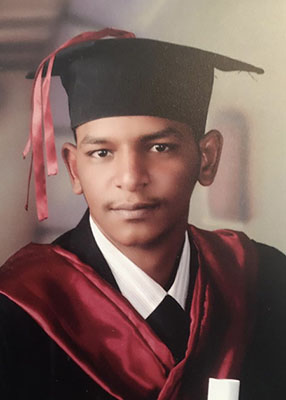
Learn more about Sudan here and here and here and here.
shiraz@shirazn.es
I remember first meeting Moayyad when I was eight years old. He must have been eleven or twelve, close to my sister’s age probably. He had a raspy voice and an infectious laugh back then . . . and he was always eager to speak with me and my siblings in English. Moayyad’s English was impressive. Most of my other cousins only knew how to ask, “how are you?” and respond, “fine, thank you,” but Moayyad held lengthy conversations with us. He was one of the few cousins I spoke to in English exclusively, even after learning Arabic and speaking it everyday, and I think we both preferred this.
We always spoke to each other in English, but Moayyad taught me things about myself that I couldn’t properly access in America. He helped me understand Sudanese customs and traditions that aren’t valued or even recognized in the West: how and why we gather around communal and congregational spaces, engage in regular prayer, and serve tea so often throughout the day. In exchange, I shared insights on American pop culture, fast food, and other things that feel frivolous now.
Moayyad and I translated ourselves with a shared interest in learning something new and bridging our differences, which, in hindsight, weren’t that different from each other. And as I look back and reflect, I don’t think I’ve known anyone with Moayyad’s courage and curiosity. Just by talking to me and making himself available with consistency, he made me feel like anything was possible . . . like the connections we built were something to be cherished and sustained and honored with each new conversation, like this perpetual honoring could lead to virtually anything we envisioned for ourselves. I didn’t always understand this as a little kid, because I was shy and socially awkward, and because I grew up in a country where people are expected to function in isolation. But I think I understand now.
Moayyad Ibrahim Mohammad Musa passed away in late July of 2023. He was stuck in Halfa, a city nestled at the border between Egypt and Sudan, where he spent three months waiting for visa clearance to enter Egypt. He spent three months desperately trying to escape the bloody conflict between our country’s military and paramilitary forces. He spent three months telling his parents, siblings, and relatives that he’d see them soon, and alhamdulillah, he is doing fine. Like many others who are still waiting at the border, Moayyad slept on hot floors in masjids and relied on strangers for food and basic necessities. He most definitely was not alone, but I’m sure he felt isolated.
Sudanese relationships tend to hinge on an interdependent framework that falls apart when separation and siloes are made apparent, or even implied, in a dynamic. We don’t do well on our own; we’re much better off when we can call on folks to lend a hand or simply listen to us when we need to talk. My parents and I keep asking ourselves if we could have done something to protect Moayyad from feeling so isolated, and while it may not be healthy to indulge in this line of questioning, I can’t stop myself from posing, asking, wondering.
Moayyad, if I could turn back time, I’d be there with you and reassure you that you aren’t alone. I’d ask your parents and mine about alternatives and insist that we take a bus to Port Sudan, because I’ve never been. I’d distract you from your legitimate frustrations by playing up my American traits, which have always been a source of entertainment for you. I’d ask you about your goals and dreams. I’d ask about your favorite song. If I could turn back time, Moayyad, I’d tear down this wall that is both impenetrable and suffocating and make it known that you aren’t alone, just as you did for me.

Learn more about Sudan here and here and here and here.
shiraz@shirazn.es